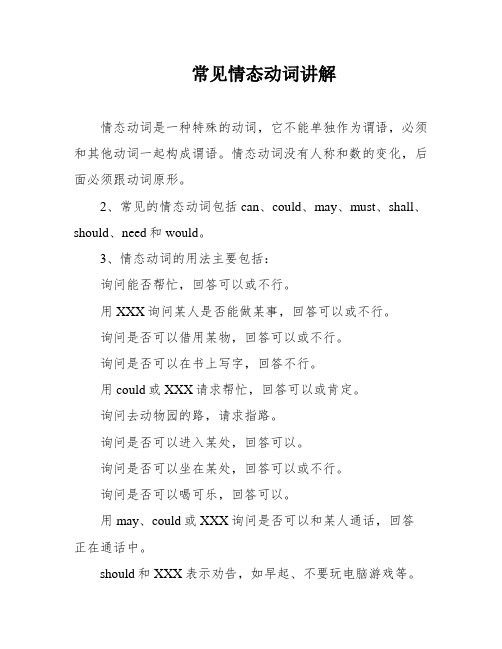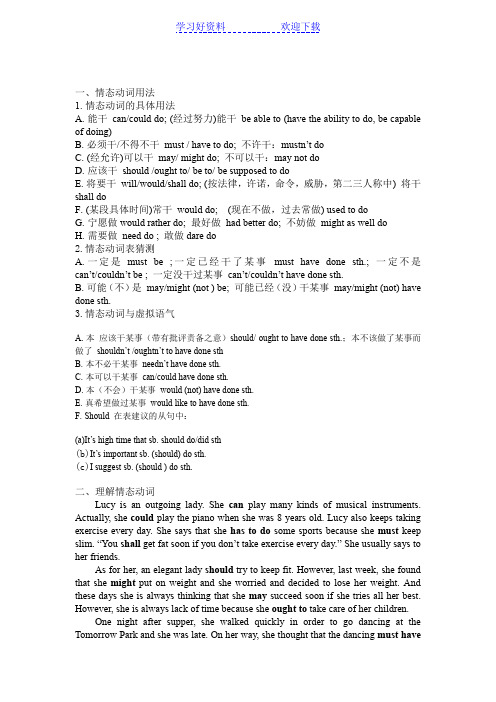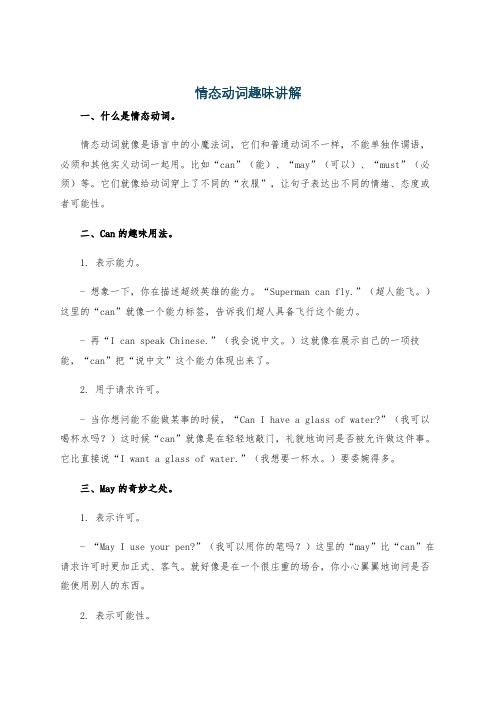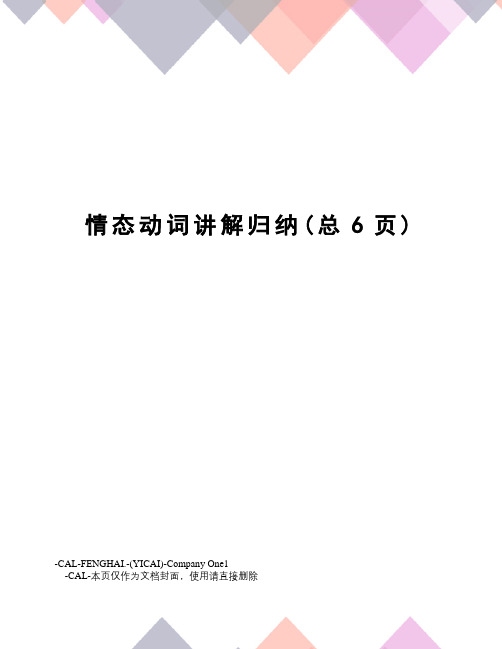情态动词讲解 最好版
情态动词(基础讲解)

情态动词的用法【用法讲解】考试要求:中考要求掌握情态动词在一般疑问句的问与答,理解情态动词表示猜测的用法及情态动词的被动语态应用.情态动词表示说话人对某一动作或状态的态度,认为“可能”,“应该”或“必要”等。
情态动词本身词义不完全,不能独立作谓语动词,必须和动词原形连用(ought除外)。
情态动词没有人称和单复数的变化。
常用情态动词有can(could),may(might),must, ought to,have to,need, dare, shall(should),will(would)。
1. 情态动词can 和could的主要用法(1)表示能力,意为“能,会”。
Can you swim? 你能游泳吗?His granny is over eighty but still can read without glasses。
他的奶奶虽然八十多岁了,但是仍旧不用戴眼镜能够阅读。
注意:can和be able to表示“能力”时的区别:can只有现在式和过去式两种形式,而be able to除了现在式和过去式,还有将来式和完成式等多种形式.She will be able to help you tomorrow afternoon。
明天下午她将能帮助你.This is the information that I have been able to get so far.这是我到目前为止能得到的信息。
(2)表示“许可,允许"。
can 和could没有时态上的区别,could比can在语气上更客气;在回答could引导的一般疑问句时要用can。
Could/Can you tell me the way to the railway station?你能告诉我去火车站的路吗?—Could I use your pen?我可以用你的钢笔吗?—Yes,of course you can。
是,当然你可以。
常见情态动词讲解

常见情态动词讲解情态动词是一种特殊的动词,它不能单独作为谓语,必须和其他动词一起构成谓语。
情态动词没有人称和数的变化,后面必须跟动词原形。
2、常见的情态动词包括can、could、may、must、shall、should、need和would。
3、情态动词的用法主要包括:询问能否帮忙,回答可以或不行。
用XXX询问某人是否能做某事,回答可以或不行。
询问是否可以借用某物,回答可以或不行。
询问是否可以在书上写字,回答不行。
用could或XXX请求帮忙,回答可以或肯定。
询问去动物园的路,请求指路。
询问是否可以进入某处,回答可以。
询问是否可以坐在某处,回答可以或不行。
询问是否可以喝可乐,回答可以。
用may、could或XXX询问是否可以和某人通话,回答正在通话中。
should和XXX表示劝告,如早起、不要玩电脑游戏等。
用should询问某人是否应该做某事,回答肯定或否定。
表示建议时可以用“你愿意…吗”来引导。
He said it was okay for me to smoke in the room。
Instead of using "may" to answer ns。
it's better to use phrases like "Yes。
please," "Certainly," "Please don't," "You'd better not," or "No。
you mustn't" XXX。
He might be at home。
but I'm not sure。
She may not be aware of this matter。
They could be having a meeting。
but I'm uncertain。
中考常考的十个情态动词详细讲解

情态动词有具体的词义,但也同助动词一样,需要与动词原形一起构成句子的谓语,另外情态动词没有人称和数的变化,情态动词后必须跟动词原形。
一. 10个最重要情态动词的用法1. can⑴ 表示能力,一般译为“能、会”,尤其指生来具备的能力。
She can swim fast, but I can’t .她会游泳,但我不会。
⑵ 表示许可,常在口语中。
You can use my dictionary.你可以使用我的词典。
⑶ 表示推测,意为“可能”,常用于否定句和疑问句中,此时can’t译为“不可能”。
Can the news be true?这个消息可能是真的吗?It can’t be our teacher. He is on a visit to the Great Wall.不可能是我们老师。
他正在参观长城呢。
2. could⑴ can的过去式,意为“能、会”,表示过去的能力。
He could write poems when he was 10.他十岁的时候就会写诗。
⑵ could在疑问句中,表示委婉请求的语气,此时could没有过去式的意思。
Could you do me a favour?你可以帮我一个忙吗?—Could I use your pen? 我可以使用你的钢笔吗?—Yes, you can.(注意回答)可以。
3. may⑴ 表示请求、许可,比can正式,May I borrow your bike?我可以借用你的自行车吗?You may go home now.你现在可以回家了。
⑵ 表示推测,谈论可能性,意为“可能,或许”,一般用于肯定句中。
It may rain tomorrow .明天可能会下雨。
⑶ may的过去式为 might。
might 也可以表示可能性低于may(此时might没有过去式的意思)。
He is away from school. He might be sick.他离开学校了。
初中英语情态动词讲解

情态动词(一)情态动词的定义: 情态动词表示说话人对某一动作或状态的态度。
(二)情态动词的特点1. 情态动词有一定的词义。
2. 情态动词不能单独做谓语,它必须和其他动词的原形一起构成谓语。
3. 情态动词没有人称,数的变化。
(三)情态动词的结构和意义1.情态动词的基本句型肯定句:主语+情态动词+动词原形+......否定句:主语+情态动词+not+动词原形+......疑问句:情态动词+主语+动词2. 情态动词的意义must“必须”;can/could“能,会”;may/might “可以”;should“应该”;would“愿,要”;have to“不得不”;need“需要”used to do 过去常常做.... Had better do sth 做好做某事(四)情态动词的基本用法1.can (could主要指过去时间)1)肯定句中,表示人或物本身所具有的能力,意为“能,能够,会” :Two eyes can see more than one. / I can swim very well.2)否定和疑问句中,表示可能(理论上或是逻辑判断,could 比can的可能性更小)He can’t (couldn’t) have enough money for a new car.Could it be Henry ?3)疑问中,表示请求、允许:(could表示比can的语气更委婉客气)--Can (Could) you lend me a hand? 帮我一把好吗?2. may (might)1)疑问句中,表允许,或者征求意见。
(might既指过去时间,也可指现在时间,语气比may更委婉)。
在回答May / (Might) /can ( could )I .....? 肯定回答一般用:yes ,you may /can , 或Yes, please. / Certainly./Sure./Of course. ;否定回答:用:No ,you may not / No ,you can’t / No ,you must not(mustn’t)(禁止)/ No, you had better not(最好别)2)肯定句中,may表可能, 但可能性不如can肯定,(might既可以指过去时间,也可以指现在时间,但语气上不如may 肯定)。
高中英语情态动词讲解

一、情态动词用法1.情态动词的具体用法A.能干can/could do; (经过努力)能干be able to (have the ability to do, be capable of doing)B.必须干/不得不干must / have to do; 不许干:mustn’t doC.(经允许)可以干may/ might do; 不可以干:may not doD.应该干should /ought to/ be to/ be supposed to doE.将要干will/would/shall do; (按法律,许诺,命令,威胁,第二三人称中) 将干shall doF.(某段具体时间)常干would do; (现在不做,过去常做) used to doG.宁愿做would rather do; 最好做had better do; 不妨做might as well doH.需要做need do ; 敢做dare do2.情态动词表猜测A.一定是must be ;一定已经干了某事must have done sth.; 一定不是can’t/couldn’t be ; 一定没干过某事can’t/couldn’t have done sth.B.可能(不)是may/might (not ) be; 可能已经(没)干某事may/might (not) have done sth.3.情态动词与虚拟语气A.本应该干某事(带有批评责备之意)should/ ought to have done sth.;本不该做了某事而做了shouldn’t /oughtn’t to have done sthB.本不必干某事needn’t have done sth.C.本可以干某事can/could have done sth.D.本(不会)干某事would (not) have done sth.E.真希望做过某事would like to have done sth.F.Should 在表建议的从句中:(a)It’s high time that sb. should do/did sth(b)It’s important sb. (should) do sth.(c)I suggest sb. (should ) do sth.二、理解情态动词Lucy is an outgoing lady. She can play many kinds of musical instruments. Actually, she could play the piano when she was 8 years old. Lucy also keeps taking exercise every day. She says that she has to do some sports because she must keep slim. “You shall get fat soon if you don’t take exercise every day.” She usually says to her friends.As for her, an elegant lady should try to keep fit. However, last week, she found that she might put on weight and she worried and decided to lose her weight. And these days she is always thinking that she may succeed soon if she tries all her best. However, she is always lack of time because she ought to take care of her children.One night after supper, she walked quickly in order to go dancing at the Tomorrow Park and she was late. On her way, she thought that the dancing must havebegun, and the coach could have taught or shown many new moves. She was afraid that her friends might have left before she got there. She was regretful then. She should have had supper earlier, or she could have taken a taxi, and indeed she needn’t have taken a bath in advance. When she reached the park finally, she found nobody was there. She remembered suddenly that it had been reported on the radio that there would be a heavy rain that night.思考每个加黑的情态动词的含义;什么时候用情态动词的完成式,分别表达什么意思。
(完整)情态动词专题讲解

(完整)情态动词专题讲解情态助动词专题训练概说助动词(auxiliary)主要有两类:基本助动词(primary auxiliary)和情态助动词(modal auxiliary)。
基本助动词有三个:do, have和be;情态助动词有十三个:may, might; can, could; will, would; shall, should; must, need, dare, used to, ought to。
上述两类助动词的共同特征是,在协助主动词构成限定动词词组时,具有作用词的功能:1)构成否定式:He didn’t go and neither did she.The meeting might not start until 5 o'clock。
2) 构成疑问式或附加疑问式:Must you leave right now?You have been learning French for 5 years, haven’t you?3) 构成修辞倒装:Nowhere can he obtain any information about his sister。
Hardly had he arrived when she started complaining.4)代替限定动词词组:A: Who can solve this crossword puzzle?B: Tom can.A: Shall I write to him?B: Yes, do.情态助动词的特征基本助动词与情态助动词最主要的区别之一是,基本助动词本身没有词义,而情态助动词则有自己的词义,能表示说话人对有关动作或状态的看法,或表示主观设想:What have you been doing since?(构成完成进行体,本身无词义)I am afraid I must be going. (一定要)You may have read some account of the matter. (或许已经)除此之外,情态助动词还有如下词法和句法特征:1)除ought和used以外,其他情态动词后面只能接不带to的不定式。
情态动词趣味讲解

情态动词趣味讲解一、什么是情态动词。
情态动词就像是语言中的小魔法词,它们和普通动词不一样,不能单独作谓语,必须和其他实义动词一起用。
比如“can”(能)、“may”(可以)、“must”(必须)等。
它们就像给动词穿上了不同的“衣服”,让句子表达出不同的情绪、态度或者可能性。
二、Can的趣味用法。
1. 表示能力。
- 想象一下,你在描述超级英雄的能力。
“Superman can fly.”(超人能飞。
)这里的“can”就像一个能力标签,告诉我们超人具备飞行这个能力。
- 再“I can speak Chinese.”(我会说中文。
)这就像在展示自己的一项技能,“can”把“说中文”这个能力体现出来了。
2. 用于请求许可。
- 当你想问能不能做某事的时候,“Can I have a glass of water?”(我可以喝杯水吗?)这时候“can”就像是在轻轻地敲门,礼貌地询问是否被允许做这件事。
它比直接说“I want a glass of water.”(我想要一杯水。
)要委婉得多。
三、May的奇妙之处。
1. 表示许可。
- “May I use your pen?”(我可以用你的笔吗?)这里的“may”比“can”在请求许可时更加正式、客气。
就好像是在一个很庄重的场合,你小心翼翼地询问是否能使用别人的东西。
2. 表示可能性。
- “It may rain tomorrow.”(明天可能会下雨。
)“may”在这里就像一个小预言家,给我们一种不太确定的感觉,只是说有下雨的可能性,不是肯定会下雨。
四、Must的强硬角色。
1. 表示必要性或义务。
- “You must wear a seatbelt in the car.”(你必须在汽车里系安全带。
)“must”就像一个严厉的小警察,规定了你一定要做这件事,没有商量的余地。
2. 表示推测(用于肯定句中)- “He must be at home because his car is in the driveway.”(他一定在家,因为他的车在车道上。
情态动词讲解归纳

情态动词讲解归纳(总6页) -CAL-FENGHAI.-(YICAI)-Company One1-CAL-本页仅作为文档封面,使用请直接删除链接中考语法:情态动词一、情态动词的特点:情态动词,又叫情态助动词。
它们具有以下特点:⑴ 它们必须与其他动词连用,即:情态动词+动词原形,表示说话人对所述动作的看法,如需要、可能、意愿或怀疑等。
⑵ 绝大多数情态动词没有人称和数的变化,即第三人称单数不加-s(以be和have 开头的情态动词短语除外)。
⑶ 在意义上,情态动词具有“多义性”。
例如:can既可表示能力,又可表示可能、允许等意义。
二、部分情态动词的基本用法:1. can的基本用法:⑴ 表示体力或智力上的能力,即“能够,会”,可与be able to转换。
例如:He can speak English. / He is able to speak English. 他会讲英语。
Can you play basketball? — No, I can’t. 你会打篮球吗——我不会。
如果表示将来具备的能力,要用will be able to。
例如:If I have a good sleep, I will be able to do the problem. 假如我睡个好觉,我就能做那道题目了。
⑵ 表示许可,主要用于口语,书面语一般用may。
例如:Can we go home now, please? — No, you can’t. 我们可以现在就回家吗——不可以。
You can only smoke in this room. 你只能在这间房间里抽烟。
You can’t keep the library books for more than a month. 图书馆的书借期不可超过一个月。
⑶ 表示“可能”,与may同义,但一般用在疑问句中。
例如:What can he possibly want 他可能会想要什么呢另外,在否定句中,否定形式can’t表示推测“不大可能”。
- 1、下载文档前请自行甄别文档内容的完整性,平台不提供额外的编辑、内容补充、找答案等附加服务。
- 2、"仅部分预览"的文档,不可在线预览部分如存在完整性等问题,可反馈申请退款(可完整预览的文档不适用该条件!)。
- 3、如文档侵犯您的权益,请联系客服反馈,我们会尽快为您处理(人工客服工作时间:9:00-18:30)。
• must • 1. “必须” 否定式:mustn’t 不应该、不许可、不准、禁 止 • You must hand in your homework before the class is over. needn’t /don’t have to “不必” • 2. 肯定式表示对现在或过去的推测,“一定” • must be doing sth./must have done sth. • He must be waiting for us now. • He must have seen the film. • 3. “非得、偏要” (常用于疑问句/条件状语从句中) • Must I play the piano at home, mum? • If you must know, her name is Lucy.
Modal Verbs
• • • • • • • • • • • • • •
can/could 1. 表示“能力”, 此时could是can的过去式 与be able to 的区别 can/could 只表示有能力做某事 be able to 表示有能力做并且确实做到了 2. 表示惊异、怀疑、猜测 (多用于否定句和疑问句中) could/can 此时表示语气强弱或可能性大小。 How can you be so rude? Michael can’t be a policeman, for he is much too short. 3. 表示“请求、许可” 翻译成“可以” 此时could语气 更委婉。 Can/could I use your car tomorrow? You can borrow some books from the library. 4. 有时会,偶尔会 It can be quite cold in May.
表虚拟,过去本来有能力/能够做某事而没有做
• • • • • • •
5. can’t/couldn’t have done __________________________________ 表推测,过去不可能做过某事 6. may/ might (not)have done ________________________________ _________________________________ 表推测,过去也许/或许(没)做了某事 7. needn’t have done 表虚拟, 过去本可以/可能做某事而实际没有做 _____________________________
• • • • • • • • •
will/would 1. 表示“请求、建议” would 语气更委婉 Will/would you please open the door? Would you pass me the book? 2. 表示意愿、意志和决心。 此时would 是will的过去式 I will never do that again. He said he would help us out of trouble. 3. would 表示过去经常发生或习惯性的动作,“总是” He would go swimming in summer when he lived in the countryside. • used to do过去常常…但现在已不再…
• should/ought to • 1. 表示责任或义务上“应该” • ought to 的语气更强 should 含有建议、劝 告的意味。 • 2. should 表推测 “应该” • 3. 竟然 • I can’t imagine that he should behave so rudely at the party. • 4.万一(if条件从句中) If the computer should break down, we’ll at the expenses.
• may/might • 1. 表示“请求、许可”, might 语气更委婉,此 时可与could/can 互换 • May I ask you for help? • 2. may 放到句首时表祝愿 • May you succeed!/ May God bless you! • 3. 表推测 “也许、可能” • He may come here tomorrow. • may well do 很可能 • may/might as well do egret saying what he did but felt that C he ______ it differently. • A. could express • B. would express • C. could have expressed • D. must have expressed • 4.------Hi, Tom. Any idea where Jane is? • ------She ______ in the classroom. I saw C her there just now. • A. shall be B. shouldn’t have been C. must be D. might have been
• must 与have to do 的区别: • must 表示说话人的主观看法 “必须” • have to do 表示客观上需要,不得不做某 事,有人称、数和时态的变化。
• • • • •
•
• • •
shall 1. 用在一、三人称疑问句中,表示向对方征求意见 Shall we begin our class? When shall he be able to leave the hospital? 2. 用在第二、三人称陈述句中,表示说话人给对方的命令、 警告、允诺、威胁。 You shall be punished if you keep on coming to school late. He shall be fired . 3. 根据某项协议规定 “应该” You shall bring down the price according to the agreement.
• didn’t need to do 本来没有必要做某事 • would have done 本来会去做
• 1. One of the few things you D _____ say about English people with certainty is that they talk a lot about the weather. • A. need B. must C. should D. can • 2. The biggest problem for most plants, which ____ just get up and run away B when threatened, is that animals like to eat them. • A. shan’t B. can’t C. needn’t D. mustn’t
• • • •
need/dare 情态、实义动词 need 必须、需要 (常用于否定和疑问句中) dare 敢 (常用语否定、疑问和条件句中) need to do/dare to do 有人称、数和时态 的变化 • I dare say… 我敢说,我认为
• 情态动词+have done 表示推测和虚拟 • 1. must have done 只用于肯定句中,表示对过去情况肯 定的推测 • 2. should have done • _________________________________ 表推测,过去应该做了某事 • _________________________________ 表虚拟,过去本应该做某事而实际没有做 • 3. shouldn’t have done • __________________________________ 表推测,过去不应该做了某事 • __________________________________ 表虚拟,过去本不应该做某事而实际上做了 • 4. can/could have done • ___________________________________ 表推测,过去可能做了某事 • ____________________________________
